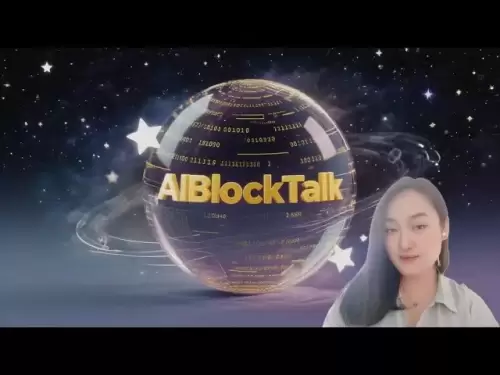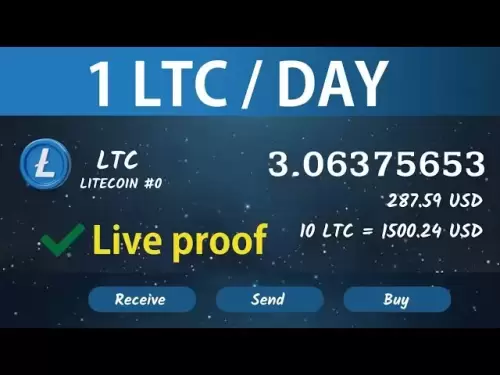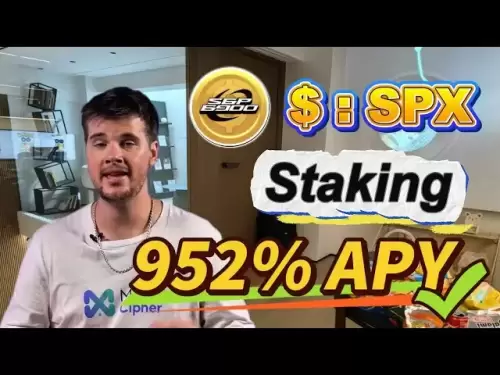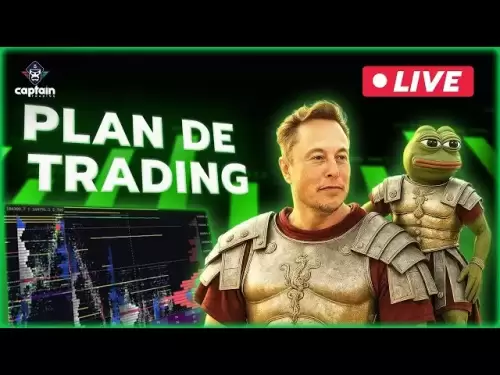-
 Bitcoin
Bitcoin $118900
0.42% -
 Ethereum
Ethereum $3710
-2.88% -
 XRP
XRP $3.513
-2.96% -
 Tether USDt
Tether USDt $1.000
-0.01% -
 Solana
Solana $203.0
3.65% -
 BNB
BNB $765.5
-1.29% -
 USDC
USDC $0.9998
0.00% -
 Dogecoin
Dogecoin $0.2671
-4.18% -
 Cardano
Cardano $0.8817
-3.63% -
 TRON
TRON $0.3139
-0.64% -
 Hyperliquid
Hyperliquid $44.34
-5.45% -
 Stellar
Stellar $0.4637
-4.08% -
 Sui
Sui $3.908
-2.59% -
 Chainlink
Chainlink $19.34
-2.62% -
 Hedera
Hedera $0.2712
-3.77% -
 Avalanche
Avalanche $24.97
-4.13% -
 Bitcoin Cash
Bitcoin Cash $519.8
-1.48% -
 Shiba Inu
Shiba Inu $0.00001518
-3.74% -
 Litecoin
Litecoin $115.6
-2.21% -
 Toncoin
Toncoin $3.460
3.68% -
 UNUS SED LEO
UNUS SED LEO $8.977
-0.07% -
 Polkadot
Polkadot $4.460
-2.96% -
 Uniswap
Uniswap $10.53
-5.43% -
 Ethena USDe
Ethena USDe $1.001
0.01% -
 Monero
Monero $323.6
-0.36% -
 Pepe
Pepe $0.00001379
-2.60% -
 Bitget Token
Bitget Token $4.772
-3.90% -
 Dai
Dai $0.9999
0.00% -
 Aave
Aave $307.5
-6.66% -
 Bittensor
Bittensor $441.8
0.84%
Do I need to pay gas fees when buying and selling AVAX?
Gas fees on Avalanche are paid in AVAX for transaction processing; they vary and are not refundable if transactions fail.
Apr 19, 2025 at 08:42 am
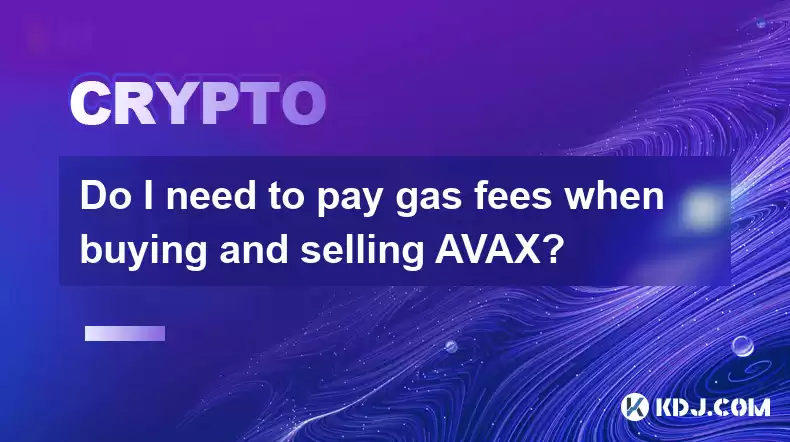
When engaging with the Avalanche (AVAX) network, understanding the role of gas fees is crucial. Gas fees are payments made to validators on the network for processing and validating transactions. These fees are essential for the smooth operation of the blockchain, as they incentivize validators to keep the network running efficiently. In this article, we will explore whether you need to pay gas fees when buying and selling AVAX and delve into the specifics of how these fees work on the Avalanche network.
What Are Gas Fees on the Avalanche Network?
Gas fees on the Avalanche network are similar to those on other blockchain networks like Ethereum. They are transaction fees paid in AVAX, the native cryptocurrency of the Avalanche network. These fees are necessary for executing transactions, smart contracts, and other operations on the blockchain. The primary purpose of gas fees is to prevent spam and ensure that the network remains fast and efficient.
Do You Pay Gas Fees When Buying AVAX?
When you buy AVAX, the payment of gas fees depends on the method and platform you use. If you are purchasing AVAX through a centralized exchange like Binance or Coinbase, you typically do not pay gas fees directly. These exchanges handle the transaction fees internally, and the costs are often included in the trading fees they charge. However, if you are buying AVAX directly on the Avalanche network, such as through a decentralized exchange (DEX) or by interacting with a smart contract, you will need to pay gas fees.
Do You Pay Gas Fees When Selling AVAX?
Similar to buying AVAX, the payment of gas fees when selling AVAX depends on the platform and method you use. If you are selling AVAX on a centralized exchange, you generally do not pay gas fees directly. The exchange will handle the transaction fees, which are typically included in the trading fees they charge. However, if you are selling AVAX on the Avalanche network through a DEX or a smart contract, you will need to pay gas fees to process the transaction.
How Are Gas Fees Calculated on the Avalanche Network?
Gas fees on the Avalanche network are calculated based on the computational resources required to process a transaction or execute a smart contract. The fee is determined by two main factors: the gas price and the gas limit. The gas price is the amount of AVAX you are willing to pay per unit of gas, while the gas limit is the maximum amount of gas you are willing to use for the transaction. The total fee is then calculated as the product of the gas price and the actual amount of gas used.
How to Check and Estimate Gas Fees on Avalanche
To effectively manage your transactions on the Avalanche network, it's important to know how to check and estimate gas fees. Here's a step-by-step guide on how to do this:
Using a Wallet: If you are using a wallet like MetaMask or Core, you can check the estimated gas fees before confirming a transaction. When you initiate a transaction, the wallet will display the estimated gas fee based on current network conditions.
- Open your wallet and navigate to the transaction section.
- Enter the details of your transaction (e.g., the amount of AVAX you want to send).
- The wallet will display the estimated gas fee. You can adjust the gas price if you want to speed up or slow down the transaction.
- Confirm the transaction once you are satisfied with the gas fee.
Using a DEX or DeFi Platform: If you are using a decentralized exchange or a DeFi platform, the platform itself will often provide an estimate of the gas fees.
- Navigate to the transaction or swap section of the DEX or DeFi platform.
- Enter the details of your transaction.
- The platform will display the estimated gas fee.
- You can adjust the gas price if the platform allows it.
- Confirm the transaction once you are satisfied with the gas fee.
Using a Gas Fee Estimator Tool: There are also third-party tools and websites that provide gas fee estimates for the Avalanche network.
- Visit a reputable gas fee estimator tool for Avalanche.
- Enter the details of your intended transaction.
- The tool will provide an estimate of the gas fee based on current network conditions.
How to Minimize Gas Fees on the Avalanche Network
Minimizing gas fees can help you save money and make your transactions more cost-effective. Here are some strategies to minimize gas fees on the Avalanche network:
Timing Your Transactions: Gas fees can fluctuate based on network congestion. By timing your transactions during periods of low network activity, you can often pay lower gas fees.
- Monitor the Avalanche network's activity using blockchain explorers or gas fee estimator tools.
- Execute your transactions during off-peak hours when the network is less congested.
Adjusting Gas Prices: Some wallets and platforms allow you to adjust the gas price for your transactions. By setting a lower gas price, you can reduce your fees, though this may result in longer transaction times.
- When initiating a transaction, look for the option to adjust the gas price.
- Set a lower gas price if you are willing to wait longer for your transaction to be processed.
Batching Transactions: If you need to perform multiple transactions, consider batching them into a single transaction. This can reduce the overall gas fees you pay.
- Use smart contracts or wallets that support batching transactions.
- Combine multiple operations into a single transaction to minimize the number of times you need to pay gas fees.
Frequently Asked Questions
Q: Can gas fees on the Avalanche network be refunded if a transaction fails?
A: No, gas fees on the Avalanche network are not refundable. If a transaction fails, the gas fee paid to the validators for processing the transaction is not returned.
Q: Are gas fees on the Avalanche network fixed or can they vary?
A: Gas fees on the Avalanche network can vary based on network congestion and the complexity of the transaction. The fees are not fixed and can change from one transaction to another.
Q: How do gas fees on the Avalanche network compare to those on the Ethereum network?
A: Gas fees on the Avalanche network are generally lower than those on the Ethereum network, especially during periods of high congestion on Ethereum. However, the exact comparison can vary based on current network conditions and the specific transactions being performed.
Q: Can I use a different cryptocurrency to pay gas fees on the Avalanche network?
A: No, gas fees on the Avalanche network must be paid in AVAX, the native cryptocurrency of the network. Other cryptocurrencies cannot be used to pay these fees.
Disclaimer:info@kdj.com
The information provided is not trading advice. kdj.com does not assume any responsibility for any investments made based on the information provided in this article. Cryptocurrencies are highly volatile and it is highly recommended that you invest with caution after thorough research!
If you believe that the content used on this website infringes your copyright, please contact us immediately (info@kdj.com) and we will delete it promptly.
- PNC Bank & Coinbase: Banking on Crypto's Future, NYC Style
- 2025-07-23 06:30:12
- Ruvi AI: The Next Avalanche Riding the AI and Blockchain Wave?
- 2025-07-23 06:30:12
- SEC, Bitcoin, and Crypto: Navigating the Wild West of Digital Finance
- 2025-07-23 04:30:12
- BlockDAG Mining Revolution: 10x Rewards and Crypto's Next Big Thing?
- 2025-07-23 06:10:12
- Tyre Legalities, the 20p Test, and Expert Advice: Staying Safe on the Road
- 2025-07-23 04:50:12
- Liberty Head Double Eagle Proofs: A Golden Opportunity?
- 2025-07-23 04:55:12
Related knowledge

What is Chainlink (LINK)?
Jul 22,2025 at 02:14am
Understanding Chainlink (LINK): The Decentralized Oracle NetworkChainlink is a decentralized oracle network designed to bridge the gap between blockch...

What is Avalanche (AVAX)?
Jul 22,2025 at 08:35am
What is Avalanche (AVAX)?Avalanche (AVAX) is a decentralized, open-source blockchain platform designed to support high-performance decentralized appli...

What is Polkadot (DOT)?
Jul 19,2025 at 06:35pm
Understanding the Basics of Polkadot (DOT)Polkadot (DOT) is a multi-chain network protocol designed to enable different blockchains to transfer messag...

What is Monero (XMR)?
Jul 21,2025 at 10:07am
What is Monero (XMR)?Monero (XMR) is a decentralized cryptocurrency designed to provide enhanced privacy and anonymity for its users. Unlike Bitcoin a...

How to add indicators to Ethereum chart on TradingView?
Jul 19,2025 at 07:15am
What Is an Ethereum Chart on TradingView?The Ethereum chart on TradingView is a visual representation of the price movement of Ethereum (ETH) over a s...
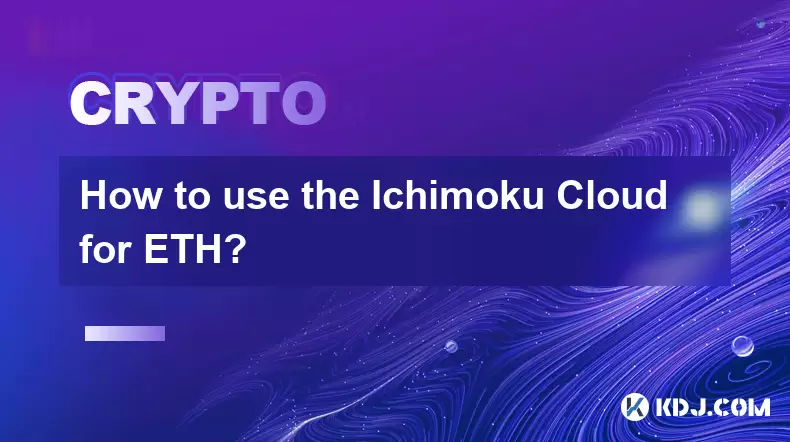
How to use the Ichimoku Cloud for ETH?
Jul 18,2025 at 09:56pm
Understanding the Ichimoku Cloud and Its ComponentsThe Ichimoku Cloud, also known as Ichimoku Kinko Hyo, is a versatile technical analysis tool that p...

What is Chainlink (LINK)?
Jul 22,2025 at 02:14am
Understanding Chainlink (LINK): The Decentralized Oracle NetworkChainlink is a decentralized oracle network designed to bridge the gap between blockch...

What is Avalanche (AVAX)?
Jul 22,2025 at 08:35am
What is Avalanche (AVAX)?Avalanche (AVAX) is a decentralized, open-source blockchain platform designed to support high-performance decentralized appli...

What is Polkadot (DOT)?
Jul 19,2025 at 06:35pm
Understanding the Basics of Polkadot (DOT)Polkadot (DOT) is a multi-chain network protocol designed to enable different blockchains to transfer messag...

What is Monero (XMR)?
Jul 21,2025 at 10:07am
What is Monero (XMR)?Monero (XMR) is a decentralized cryptocurrency designed to provide enhanced privacy and anonymity for its users. Unlike Bitcoin a...

How to add indicators to Ethereum chart on TradingView?
Jul 19,2025 at 07:15am
What Is an Ethereum Chart on TradingView?The Ethereum chart on TradingView is a visual representation of the price movement of Ethereum (ETH) over a s...

How to use the Ichimoku Cloud for ETH?
Jul 18,2025 at 09:56pm
Understanding the Ichimoku Cloud and Its ComponentsThe Ichimoku Cloud, also known as Ichimoku Kinko Hyo, is a versatile technical analysis tool that p...
See all articles





















